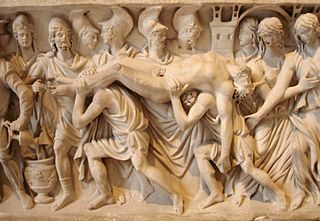In Greek mythology, Epistrophus[ pronunciation? ] (Ἐπίστροφος) may refer to:

Greek mythology is the body of myths originally told by the ancient Greeks. These stories concern the origin and the nature of the world, the lives and activities of deities, heroes, and mythological creatures, and the origins and significance of the ancient Greeks' own cult and ritual practices. Modern scholars study the myths in an attempt to shed light on the religious and political institutions of ancient Greece and its civilization, and to gain understanding of the nature of myth-making itself.
- Epistrophus, son of Iphitus by Hippolyte or Thrasybule and brother of Schedius. He was counted among the suitors of Helen. [1] Together with his brother he led the Phocians on the side of the Achaeans in the Trojan War, commanding forty ships. [2] [3] [4] Epistrophus, was killed at the Trojan war by Hector. Both brothers' bones, were carried back and buried at Anticyra. [5] There tomb existed until the Roman times.
- Epistrophus, an ally of the Trojans, leader of the Halizones. [6]
- Epistrophus, son of Euenus, grandson of Selepius and brother of Mynes; both brothers were killed by Achilles during the latter's invasion in Lyrnessus. [7]
Schedius was a name attributed to four individuals in Greek mythology.

In Greek mythology, Helen of Troy, also known as Helen of Sparta, was said to have been the most beautiful woman in the world. She was married to King Menelaus of Sparta but was abducted by Prince Paris of Troy after the goddess Aphrodite promised her to him in the Judgement of Paris. This resulted in the Trojan War when the Achaeans set out to reclaim her. She was believed to have been the daughter of Zeus and Leda, and was the sister of Clytemnestra, Castor, Polydeuces, Philonoe, Phoebe and Timandra.

The Achaeans constitute one of the collective names for the Greeks in Homer's Iliad and Odyssey. The other common names are Danaans and Argives while Panhellenes and Hellenes both appear only once; all of the aforementioned terms were used synonymously to denote a common Greek civilizational identity. In the historical period, the Achaeans were the inhabitants of the region of Achaea, a region in the north-central part of the Peloponnese. The city-states of this region later formed a confederation known as the Achaean League, which was influential during the 3rd and 2nd centuries BC.

